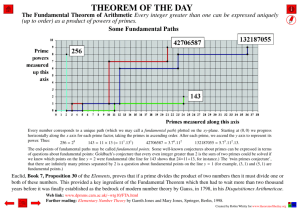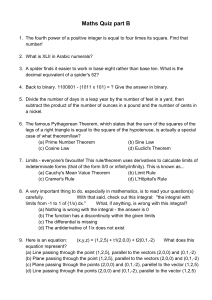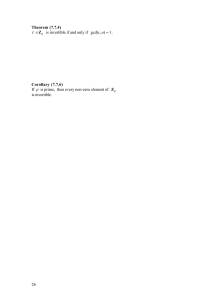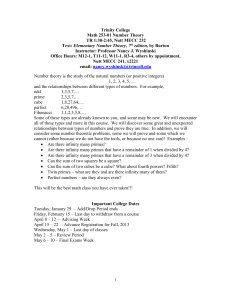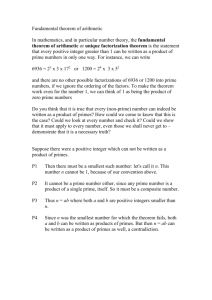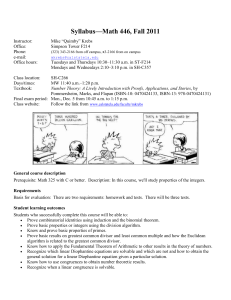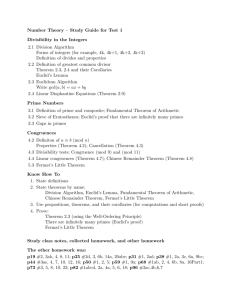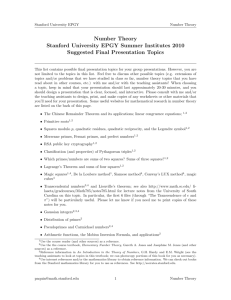On the divisibility of Fermat quotients
advertisement
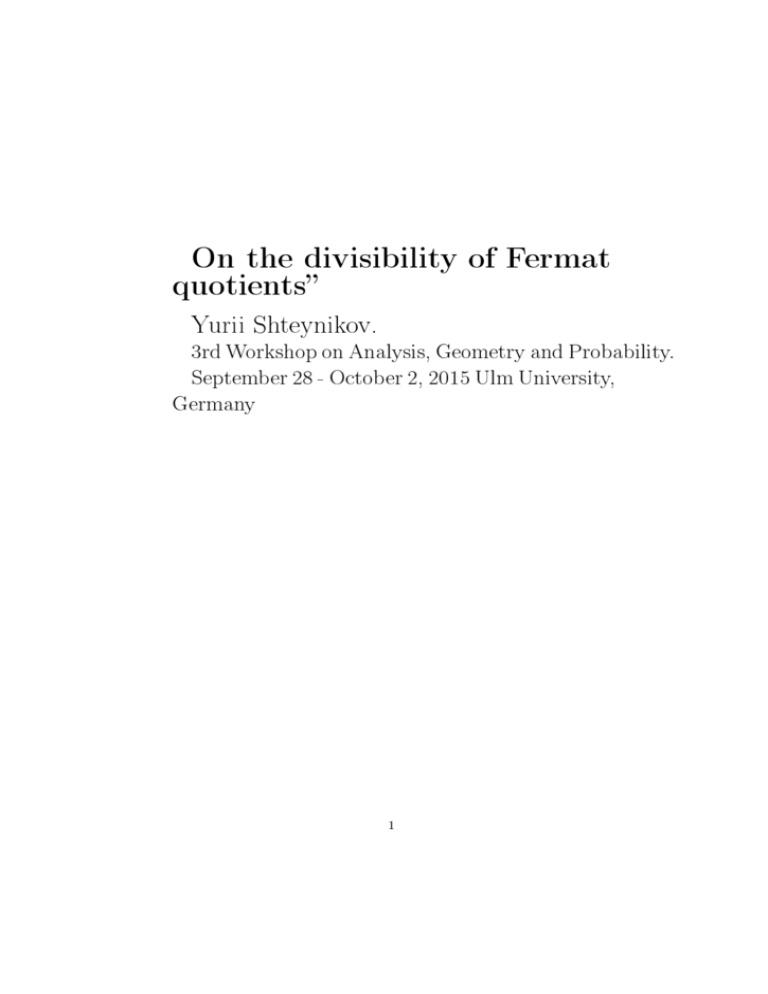
On the divisibility of Fermat
quotients
Yurii Shteynikov.
3rd Workshop on Analysis, Geometry and Probability.
September 28 - October 2, 2015 Ulm University,
Germany
1
Denitions: p - suciently large prime
number
Fermat's Little Theorem: For a prime
p and for a with gcd(a, p) = 1
ap−1 ≡ 1
(mod p).
Denitions For prime p and for a with
gcd(a, p) = 1 Fermat quotient qa(p) is
dened as
ap−1 − 1
qa(p) =
;
p
lp will denote the smallest a ∈ N, a > 1
that p does not divide qa(p).
Divisibility of Fermat quotients has some
number-theoretic applications.
1
We consider the task of estimating lp
for
1) all primes p;
2) all p with the exception of primes
from a set with relative zero density.
Another formulation of this task.
Let Gp multiplicative subgroup of (Z/p2Z)∗
of order p − 1:
Gp = {ap : 1 ≤ a ≤ p − 1}
(mod p2).
We want to estimate the rst positive
integer a: a ∈ N, a > 1 that a does not
belong to Gp for:
1) all primes p;
2) all p, with the exception of primes
from a set with relative zero density.
2
Previous rezultsEstimates for all p.
Theorem (H.W. Lenstra, 1979):
p > 3 ⇒ lp ≤ 4(log p)2;
p → ∞ ⇒ lp ≤ (4e−2 + o(1))(log p)2.
Theorem (J. Bourgain, K. Ford, S.
Konyagin, I. Shparlinski, 2010):
We have the estimate
lp ≤ (log p)
463
252 +o(1)
Argument of the proof.
For a multiplicative subgroup G ⊂ Z∗n
of order t and for positive integer k we
dene
J(n, G, k) = |({1, ..., k}
\
G)|.
We need to have good upper
T estimates
on J(n, G, k) = |({1, ..., k} G)|. The
following estimate takes place.
3
Theorem (J.Bourgain, S. Konyagin,
I. Shparlinski, 2009)
For any ε > 0 the following holds
kt Cεk X
J(n, G, k) ≤ +
Mn(ω, Z, G)|S(w, G)|,
n tn
ω∈Zn
where Z := min(n1+εk −1, n/2), Mn(ω, Z, G)
is the number of solutions of the congruence
ω ≡ zu (mod n), 1 ≤ |z| ≤ Z, u ∈ G
and
S(ω, G) :=
X
e2πigω/n
g∈G
We observe that for integer k
X
|S(ω, G)|2k = nTk (G),
ω∈Zn
where
Tk (G) := {(x1, . . . , x2k ) ∈ G(2k) : x1+. . .+xk
≡ xk+1 + . . . + x2k
(mod n)}.
Task: nd upper bounds for Tk (G).
4
The task of divisibility of Fermat quotient
corresponds to the case G := Gp.
Let t := |G|
Theorem(S. Konyagin,D.R. HeathBrown, 2000)
Let G ⊆ Z∗p , t < p1/2. We have the
bound
Tk (G) ≤ C(k)t2k−2+1/2
k−1
, p → ∞.
Theorem(I. Shkredov, 2014) We have
the bound
T2(Gp) ≤ p
32
13 +o(1)
, p → ∞.
Corrolary(I. Shkredov, 2014) We have
the bound
lp ≤ (log p)
7829
4284 +o(1)
, p → ∞.
Theorem(Y.S, 2015)
Let G ⊆ Z∗p , t = |G|, t < p1/2. We have
the bound
3 +o(1)
4 14
T3(G) ≤ t
5
, p → ∞.
II Estimates for lp for almost all
primes p.
Theorem (J. Bourgain, K. Ford, S.
Konyagin, I. Shparlinski, 2009): For
every ε > 0 there is δ > 0 such that for
all bur O(Q1−δ ) primes p < Q we have
lp ≤ (log p)
5 +ε
3
.
Theorem (Y.S, 2012): For every ε >
0 there is δ > 0 such that for all bur
O(Q1−δ ) primes p < Q we have
3
lp ≤ (log p) 2 +ε.
Arguments in the proof: For a multiplicative
subgroups G1 ⊂ Z∗p2 and G2 ⊂ Z∗p2 and
1
for positive integer N we dene
J(G1, G2, N ) = |({1, ..., N }
\
G1
2
\
G2)|.
It is not diicult to show that estimate
for lp for almost al p can be obtained with
estimates on average for J(G1, G2, N ) over
dierent pairs G1, G2.
6
How to estimate
J(G1, G2, N ) = |({1, ..., N }
\
G1
\
G2)|?
Let primes p1, p2 be the "same order".
Theorem(Y.S., 2015) We have the
following estimate
J(G1, G2, N ) (N1N2)1/2
where quantities N1, N2 are dened to be
the number of solutions to the equations
x1−x2 ≡ kp22
(mod p21), x1, x2 ∈ G1, 0 ≤ k ≤
N
p21
(mod p22), x1, x2 ∈ G2, 0 ≤ k ≤
N
p22
and
x1−x2 ≡ kp21
respectively.
A little bit other statement was proved
in the work of Bourgain, Ford, Konyagin,
Shparlinski.
7
Futher task for research
1) Consider the task of divisibility of
Fermat quotients on the powers of p: p2, p3...
2) Find non-trivial estimate on the Tk (G),
when G is a subgroup of Zp∗r , r ≥ 3.
3) Find estimates on J(G1, G2, G3N )
where
J(G1, G2, G3, N ) = |{1, ..., N }
8
\
G1
\
G2
\
G3|

